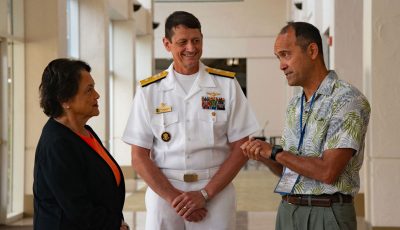‘Economic devt shouldn’t be at expense of environment’

Assistant Secretary for Insular Affairs Esther P. Kia’aina meets with some members of the Senate and House of Representatives on Wednesday. (Mark Rabago)
Assistant Secretary for Insular Affairs Esther P. Kia’aina is passionate about the environment and volunteered that the Office of Insular Affairs will now ensure that the effect of climate change will be considered before approving any federally funded projects.
“Protection of cultural and natural resources including the impact of climate change should be taken into account when you talk about economic development. Too often we’re looking at all the issues in isolation when in fact the protection of natural resources here is critically important in the overall wellbeing of the future economic development of the CNMI,” she told reporters following an impromptu meeting with some members of the Senate and House of Representatives on Wednesday.
Kia’aina, who is visiting the CNMI for the first time as assistant secretary of Insular Affairs, said the Obama administration has made climate change one of its top priorities.
“What I would like people to do is look at things holistically and realize that we’re all part of the same team in trying to advance economic development while safeguarding our beautiful oceans and protecting our coral reefs. The impact of climate change is a priority of President [Barrack] Obama, [Interior] Secretary [Sally] Jewell, and myself and as such we will be beefing up our climate change program for the Office of Insular Affairs where we will be taking into account the manner of how we provide funds for technical assistance, CIP projects, and other funding sources to ensure that climate change is considered in the development of infrastructure and energy development projects.”
She said environmental issues and climate change are close to her heart and she’s happy that Interior is making them a priority.
“That is something I care about and is the mission of the Department of the Interior. When you talk about invasive species, you talk about climate change—they’re all interrelated in that the degradation of the environment can have an adverse impact on the beautiful home environment that we call the Northern Marianas.”
Immigration and other issues
Kia’aina said another important issue the CNMI is facing is immigration reform and that part of her mission is to find out how her office can assist the islands in achieving a stable workforce.
“In order to achieve quality of life issues as well as promote economic development, government efficiency is important. One of our primary roles is to provide technical assistance, fiscal accountability, and data collection. We need the prevailing wage to be able to help in the processing of our labor issues and as a result we’ve been providing funding to the CNMI government to that end. My question is why can’t the [U.S.] Department of Labor help us. So I will be exploring that option to ensure that in the long run it would be automatic.”
OIA providing assistance to jurisdictions like the CNMI is just another classic example of what happens in all of the territories, Kia’aina said.
“I will assist whenever I can when I feel an inequity and when I feel that there are people who should be doing their jobs. When the Office of Insular Affairs can help in the interim, which we are doing now, it is clearly important for this situation but I’m looking toward a long-term solution to ensure that your Department of Commerce will have all the necessary technical assistance and tools needed in order to get the job done, whether that be on their own or in concert with the Department of Labor.”
On the matter of militarization in Pagan, Kia’aina said she needs to read up on the issue more, but appreciates the feedback given by CNMI leaders.
“I can’t comment further on Pagan. I’m actually just undertaking my due diligence with regard to understanding the complexity of issues there relating to the preservation of cultural and historic resources, geothermal development, and the expressed interest of the [U.S. Department of Defense] for military training.”
She said the issue of Pagan is very unique.
“I believe that needs to be taken into account against the big landscape of what DOD might have in mind. I appreciate the [Senate and House] members for sensitizing me to this issue because there is a federal nexus and I think my trip here is to learn first hand what is on the top of the mind of local leaders.”



























